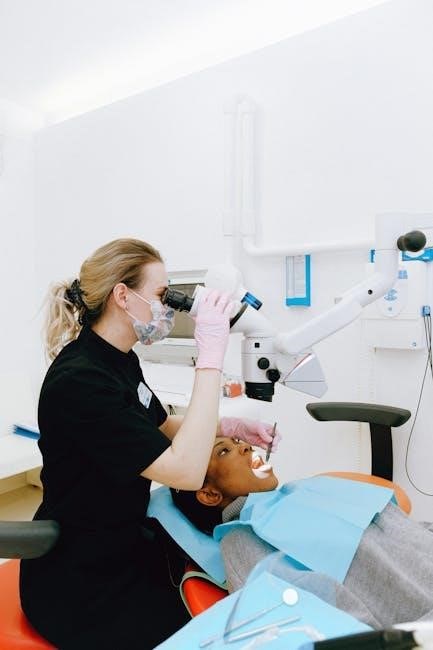This guide provides a comprehensive resource for aspiring dental assistants, covering essential topics such as roles, required skills, educational paths, and clinical training․ It also explores professional development and real-world challenges, offering structured support for success in the dental field․
1․1 Overview of the Dental Assistant Role
A dental assistant plays a supportive role in dental offices, assisting dentists and hygienists with patient care and administrative tasks․ Their responsibilities include preparing treatment rooms, sterilizing equipment, and handling patient records․ Dental assistants also interact closely with patients, ensuring their comfort and understanding of procedures․ This role requires attention to detail, strong communication skills, and the ability to work well in a team․ By supporting both clinical and administrative functions, dental assistants are essential for the smooth operation of dental practices and delivering quality patient care․
1․2 Importance of a Study Guide for Dental Assistants
A study guide is a valuable resource for dental assistants, offering structured learning materials and insights into essential topics․ It helps students understand the curriculum, prepare for exams, and master clinical skills․ The guide provides practical tips for overcoming challenges and managing stress, ensuring a smooth transition into the dental field․ By focusing on key areas like patient interaction and equipment usage, it equips aspiring dental assistants with the knowledge and confidence needed for success․ This tool is crucial for bridging classroom learning with real-world application, making it indispensable for career preparation․

Key Skills and Qualifications for Dental Assistants
Dental assistants need strong communication skills, attention to detail, and the ability to work well under pressure․ Certifications like CDA are often required for advanced roles․
2․1 Essential Skills for Success in Dental Assisting
Success as a dental assistant requires strong communication skills, attention to detail, and the ability to work efficiently in a fast-paced environment․ Interpersonal skills are crucial for interacting with patients and dental teams․ Organizational abilities help manage multiple tasks, such as preparing equipment and maintaining records․ Proficiency in using dental tools and software is also essential․ Additionally, problem-solving skills and adaptability are vital for handling unexpected situations․ Developing these skills ensures effectiveness and confidence in the role․
2․2 Required Qualifications and Certifications
To become a dental assistant, a high school diploma or equivalent is typically required․ Completing a dental assisting program accredited by the Commission on Dental Accreditation (CODA) is essential․ Certifications like Certified Dental Assistant (CDA) or Registered Dental Assistant (RDA) are often required by employers․ Additionally, state-specific certifications may be needed for tasks such as radiology or anesthesia monitoring․ Proficiency in infection control, patient safety, and dental terminology is also crucial․ These qualifications ensure competence and adherence to professional standards in the field․
Educational Requirements for Dental Assistants
Earning a high school diploma is the first step․ Completing a CODA-accredited dental assisting program is essential, followed by passing certification exams like the CDA or RDA․
3․1 Finding the Right Dental Assistant School
Choosing the right dental assistant school is crucial for a successful career․ Look for programs accredited by the Commission on Dental Accreditation (CODA) to ensure quality education․ Research schools based on program type, location, and curriculum․ Consider factors like hands-on training opportunities, experienced instructors, and modern facilities․ Reach out to recent graduates for insights and compare program lengths and costs․ Utilize resources like the CODA website to filter schools by state and accreditation status․ This step ensures you find a program that aligns with your career goals and provides a strong foundation in dental assisting․
3․2 Understanding the Curriculum and Coursework
A well-structured dental assistant program covers foundational topics like dental anatomy, terminology, and pathology․ Coursework includes clinical procedures, patient care techniques, and infection control protocols․ Students learn to assist in various treatments, from routine cleanings to complex surgeries․ The curriculum also emphasizes radiography, dental materials, and laboratory procedures․ Practical training is integrated to develop hands-on skills, ensuring readiness for real-world responsibilities․ Understanding the curriculum helps students prepare for both academic and clinical challenges, setting a solid foundation for their dental assisting career․
3․3 Preparing for Exams and Certification
Preparing for dental assistant exams and certification requires a structured approach․ Students should review course materials, practice with sample questions, and focus on key areas like clinical procedures and patient care․ Utilizing study guides and online resources can enhance understanding․ Passing the Certified Dental Assistant (CDA) exam is crucial for credentialing․ Many programs offer mock exams to simulate test conditions․ Staying organized and managing study time effectively ensures readiness․ Certification not only validates skills but also boosts career opportunities and professional credibility in the dental field․
Clinical Training and Hands-On Experience
Clinical training provides practical experience, allowing dental assistants to master essential skills like patient preparation, equipment handling, and assisting during procedures․ Hands-on practice is vital for building confidence and competence, ensuring readiness for real-world dental environments․
4․1 Importance of Clinical Training
Clinical training is crucial for dental assistants as it bridges theoretical knowledge with practical application․ It allows students to master essential skills like patient preparation, equipment handling, and assisting in procedures․ Hands-on experience builds confidence, enhances precision, and ensures readiness for real-world dental environments․ Through clinical training, aspiring dental assistants gain the proficiency needed to support dentists effectively, making it a cornerstone of their professional development and preparation for the demands of the dental field․
4․2 Essential Equipment and Tools for Dental Assistants
Dental assistants rely on specific equipment to perform their duties effectively․ Key tools include suction devices, dental drills, and sterilization equipment․ Suction devices remove saliva and debris, while drills assist in procedures․ Sterilization tools ensure a hygienic environment․ Imaging tools like X-ray machines and intraoral cameras aid in diagnostics․ Additionally, disposable items such as gloves and masks are crucial for infection control․ Mastery of these tools is vital for efficient patient care and maintaining a safe, professional dental setting․

The Role and Responsibilities of a Dental Assistant
Dental assistants play a crucial role in dental offices, assisting with procedures, preparing patients, and managing administrative tasks․ Their duties ensure smooth operations and quality patient care․
5․1 Daily Duties in a Dental Office
Dental assistants handle diverse tasks to ensure efficient office operations․ They prepare patients for procedures, sterilize equipment, and assist dentists during treatments․ Administrative duties include managing patient records, scheduling appointments, and handling billing․ They also provide patient education on oral hygiene and post-procedure care․ Effective communication with patients and team members is essential․ Additionally, dental assistants maintain a clean and organized work environment, restock supplies, and prepare treatment rooms․ Their role is vital for delivering quality care and streamlining dental practice workflows․
5․2 Patient Interaction and Communication Skills
Patient interaction is a critical aspect of a dental assistant’s role․ Effective communication helps patients feel comfortable and informed․ Dental assistants often explain procedures, answer questions, and provide reassurance to anxious patients․ Strong interpersonal skills are essential for building trust and ensuring positive patient experiences․ Clear communication also involves educating patients on oral hygiene practices and post-treatment care․ Empathy and professionalism are key in handling sensitive situations, making communication skills vital for fostering a supportive and understanding environment in the dental office․

Common Challenges and Solutions
Dental assistants often face challenges like managing stress and handling difficult patients․ Solutions include time management, effective communication, and seeking support from colleagues or mentors to ensure success․
6․1 Overcoming Difficulties in Dental Assisting School
Dental assisting school can present challenges, such as mastering clinical skills and balancing academic demands․ Students may struggle with time management and the intensity of the program․ Overcoming these difficulties requires persistence, organization, and seeking support from instructors․ Natasha, a UEI College graduate, shared her experience of being molded into an ideal dental assistant, emphasizing teamwork and patient prioritization․ Reflecting on challenges helps identify areas for improvement, fostering growth and success in the program․ Stay focused, proactive, and resilient to thrive․
6․2 Managing Stress in the Workplace
Managing stress as a dental assistant is crucial for maintaining professionalism and providing quality patient care․ Common stressors include high patient volume, complex procedures, and tight schedules․ Techniques like deep breathing, prioritizing tasks, and taking short breaks can help alleviate tension․ Maintaining a healthy work-life balance and seeking support from colleagues or mentors are also effective strategies․ Staying organized and communicating effectively with the dental team can reduce workplace stress, ensuring a positive and productive environment for both staff and patients․

Professional Development and Career Advancement
Continuing education and certifications enhance skills, while networking and specialized training open doors to advanced roles, ensuring long-term success and growth in the dental assisting field․
7․1 Continuing Education for Dental Assistants
Continuing education is crucial for dental assistants to stay updated on industry advancements and maintain certifications․ It enhances skills in patient care, infection control, and emerging technologies․ Workshops, online courses, and conferences provide opportunities to learn about new techniques and materials․ Additionally, specialized training in areas like orthodontics or dental implants can expand career opportunities․ By committing to lifelong learning, dental assistants ensure they remain competent and adaptable in a rapidly evolving field, contributing to better patient outcomes and professional growth․
7․2 Opportunities for Career Growth
Dental assistants can explore various career growth opportunities, such as specializing in orthodontics, pediatrics, or implantology․ With experience, they can transition into leadership roles like office managers or instructors․ Additionally, pursuing advanced certifications or degrees can open doors to roles like dental hygienists or lab technicians․ Some may even start their own dental assisting schools or consult for practices․ The growing demand for dental care ensures ample opportunities for advancement, making this field both rewarding and dynamic for long-term professional development․
This guide has provided essential insights into becoming a successful dental assistant, covering skills, education, and career growth․ It serves as a valuable resource for achieving your professional goals․
8;1 Final Tips for Succeeding as a Dental Assistant
Succeeding as a dental assistant requires strong communication skills, attention to detail, and the ability to multitask․ Stay organized, maintain a positive attitude, and continuously improve your knowledge․ Build rapport with patients to create a comfortable environment and ensure their trust․ Keep up with continuing education to stay updated on industry advancements․ Lastly, always prioritize patient safety and adhere to infection control protocols․ By committing to these practices, you’ll excel in your role and make a meaningful impact in dental care․
8․2 Encouragement for Pursuing Dental Assistant Training
Pursuing dental assistant training is a rewarding and impactful career choice․ It offers a balance of hands-on patient care, technical skills, and personal growth․ With strong demand for dental assistants, you’ll enjoy job stability and opportunities for advancement․ The role allows you to make a difference in patients’ lives while working in a dynamic healthcare environment․ If you’re passionate about helping others and thrive in a structured setting, dental assisting is a fulfilling path that combines purpose with professional satisfaction․
